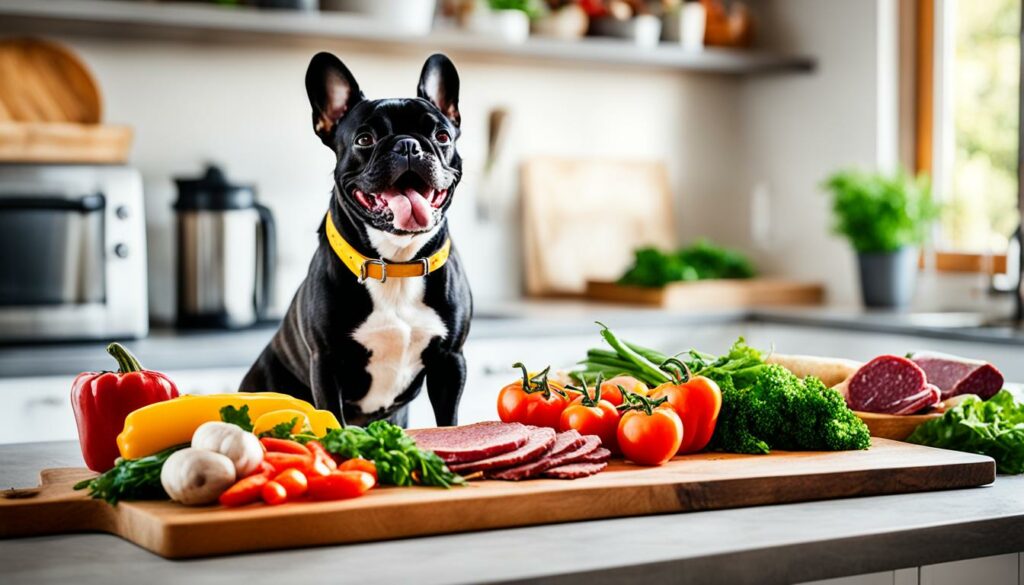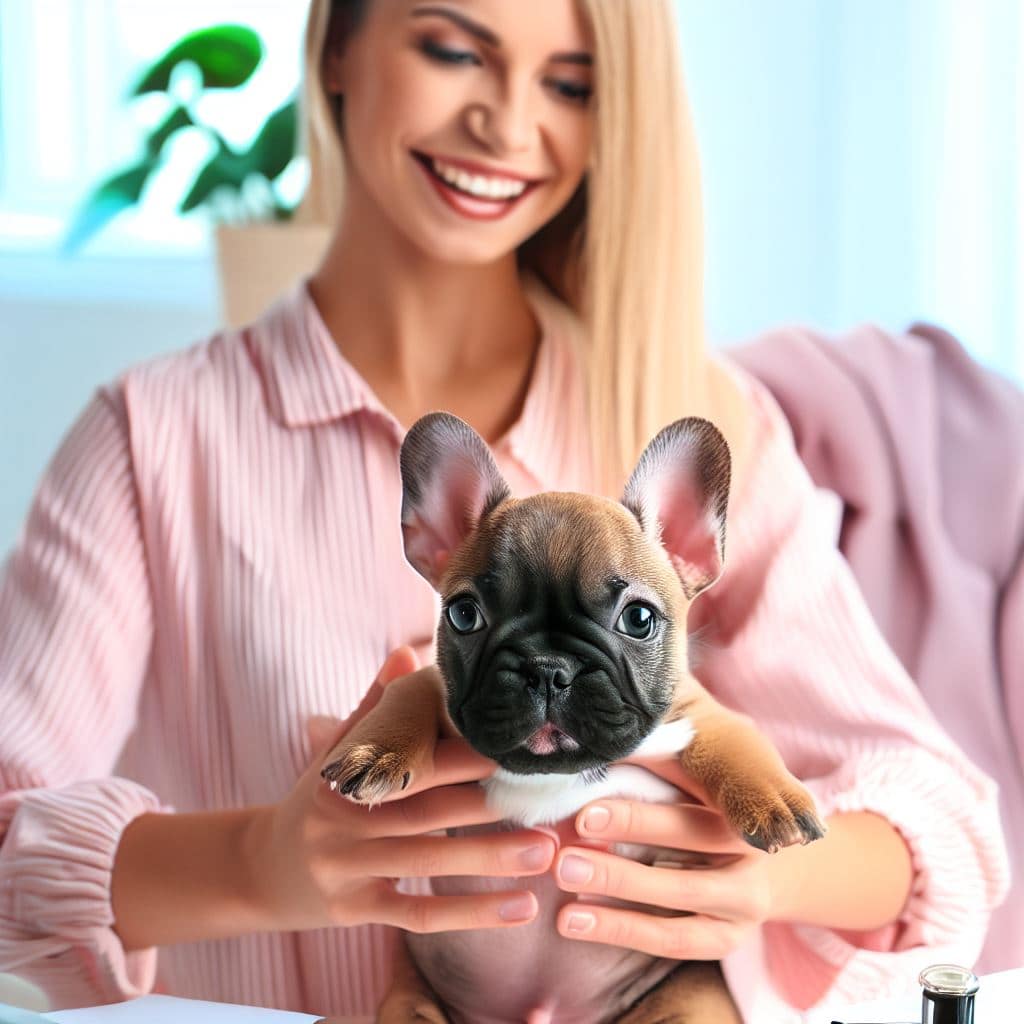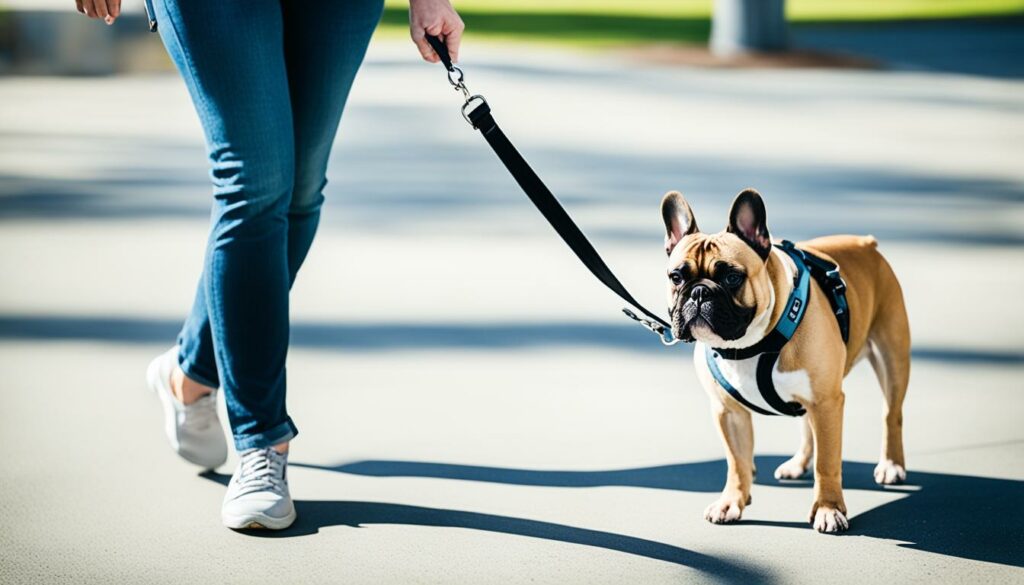I’ve been there – the struggle of house training a French Bulldog puppy. But let me tell you, it’s worth it when you see that little furball running around freely in your home.
In this article, I’ll guide you through the process, step by step. From understanding their bathroom needs to setting up a designated potty area, we’ll cover it all.
So get ready for some puppy love, because we’re about to embark on a journey to freedom!
Key Takeaways
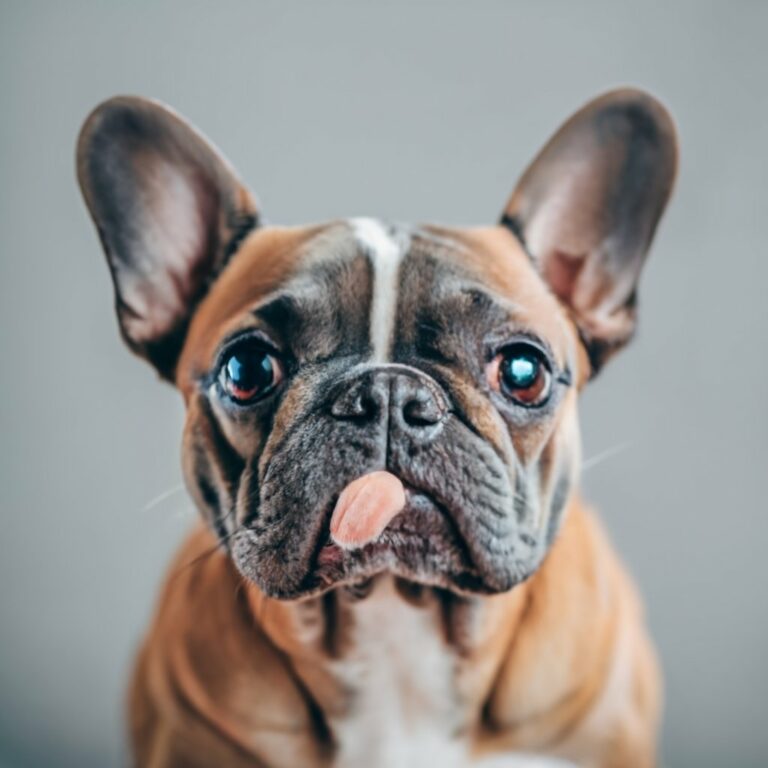
- French Bulldogs typically need to go outside to relieve themselves around 4-6 times a day.
- Setting up a designated potty area indoors can be effective in house training.
- Establishing a consistent feeding schedule helps develop a sense of routine and expectation.
- Positive reinforcement, such as treats and praise, should be used during training to encourage desired behavior.
Understanding the French Bulldog Breed’s Bathroom Needs
I’ve learned that French Bulldogs typically need to go outside to relieve themselves around 4-6 times a day. Understanding the bathroom needs of the French Bulldog breed is crucial when it comes to house training. French Bulldogs are known for their unique breed characteristics, including their small size and playful nature. However, they also have certain traits that can present challenges when it comes to potty training.
One common challenge is their stubbornness. French Bulldogs can be quite independent and may resist following a strict potty training routine. It’s important to be patient and consistent with their training, using positive reinforcement techniques to encourage them to go outside. Additionally, French Bulldogs have a relatively small bladder capacity, which means they need frequent bathroom breaks. It’s important to establish a schedule and take them outside regularly throughout the day.
Another challenge is their sensitivity to extreme temperatures. French Bulldogs are prone to overheating and can struggle in hot weather. This means that during the summer months, it’s important to monitor their bathroom breaks closely and provide them with plenty of water. On the other hand, they can also be sensitive to cold weather, so it’s essential to ensure they’re comfortable when going outside in colder temperatures.
Setting up a Designated Potty Area
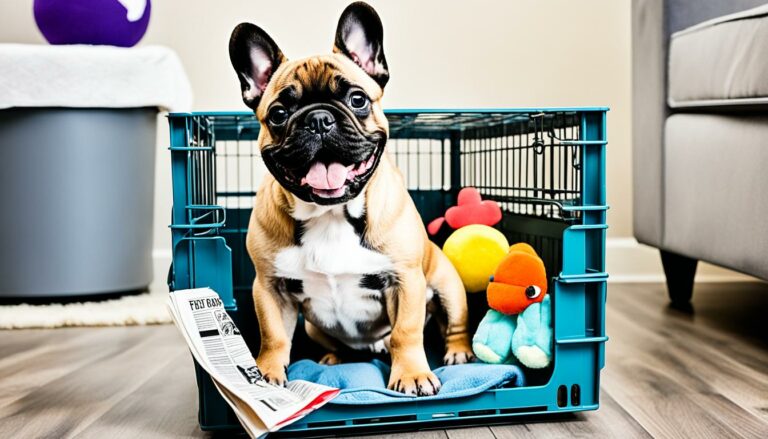
I have found that setting up a designated potty area with a potty pad has been effective in house training my French Bulldog puppy. Potty training progress can be a challenging task, especially with small breeds like French Bulldogs. However, having a designated potty area has made the process much easier and more efficient.
When it comes to potty training, there are two main methods: outdoor and indoor. Outdoor training involves taking your puppy outside to eliminate, while indoor training involves using potty pads or a designated indoor area. Both methods have their pros and cons, but I’ve found that setting up a designated potty area indoors has been the most convenient option for me.
By setting up a designated potty area with a potty pad, I’ve created a consistent and easily accessible spot for my puppy to eliminate. This has helped in establishing a routine and reinforcing the desired behavior. Additionally, using potty pads has made clean-up much easier and has prevented accidents from occurring in other areas of the house.
While outdoor potty training may be more aligned with a dog’s natural instincts, indoor training can be a great alternative, especially for those living in apartments or areas with limited outdoor access. It provides a sense of freedom and flexibility, allowing your puppy to relieve themselves without having to wait for outdoor opportunities.
Establishing a Consistent Feeding Schedule
To establish a consistent feeding schedule for my French Bulldog puppy, I rely on both a clock and an alarm to ensure regular meal times and avoid any delays. This not only helps with maintaining a routine, but also establishes boundaries for my pup.
Here are a few key points that I’ve found helpful in establishing a consistent feeding schedule:
-
Timing: I feed my puppy at the same times every day, usually in the morning and evening. This helps him develop a sense of routine and expectation.
-
Portion control: I measure out his food to ensure he’s getting the appropriate amount for his age and size. This helps maintain a healthy weight and prevents overeating.
-
Location: I’ve designated a specific spot for his meals, which helps him associate that area with eating. This establishes a boundary and prevents him from begging for food in other parts of the house.
-
Consistency: I stick to the same brand and type of food to avoid any digestive issues or food allergies. This also helps with establishing a routine and prevents any confusion.
Using Positive Reinforcement During Training
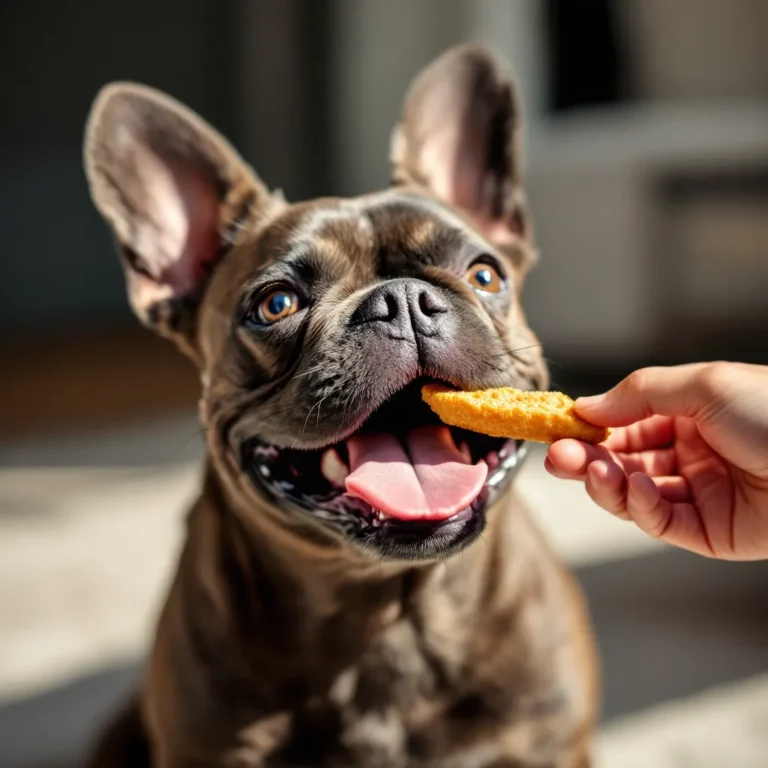
Using positive reinforcement during training is essential for establishing a strong bond with your French Bulldog puppy. By rewarding good behavior with treats, praise, or playtime, you’re reinforcing positive associations and encouraging them to repeat the behavior.
It’s important to avoid punishment methods, as these can lead to fear and anxiety in your puppy. Consistency in training is key to helping your puppy understand what’s expected of them and develop good habits.
Rewards for Good Behavior
My puppy eagerly responds to treats when he exhibits good behavior during training sessions. Using rewards as a form of positive reinforcement is a highly effective training technique.
Here are some key points to consider when using rewards for good behavior:
-
Choose high-value treats: Use treats that your puppy finds irresistible. This will motivate him to work harder and learn faster.
-
Timing is crucial: Give the treat immediately after the desired behavior is exhibited. This helps your puppy make the connection between the behavior and the reward.
-
Gradually decrease treat frequency: As your puppy becomes more proficient in his training, start phasing out treats and replace them with verbal praise or petting.
-
Use a variety of rewards: Mix up the rewards to keep your puppy engaged and excited during training sessions.
Avoid Punishment Methods
I always strive to avoid punishment methods when training my French Bulldog puppy, but instead, I focus on using positive reinforcement techniques. Positive reinforcement involves rewarding desired behaviors to encourage their repetition.
When it comes to potty training, I’ve found crate training to be an effective method. Crate training helps establish a routine and teaches the puppy to associate the crate with a safe and comfortable space. I make sure to choose a crate that’s the right size for my puppy, providing enough room to stand, turn around, and lie down comfortably.
I use treats and praise to reward my puppy for going potty in the designated outdoor area. By using positive reinforcement techniques and crate training, I’m able to effectively house train my French Bulldog puppy without resorting to punishment methods.
Consistency in Training
To ensure consistency in training, I consistently reward my French Bulldog puppy with treats and praise when he successfully follows commands. This approach has proven to be effective in teaching him basic commands and house rules.
Crate training has been a valuable tool in this process, providing a safe and comfortable space for my puppy when I can’t directly supervise him. The benefits of crate training include teaching him bladder and bowel control, preventing destructive behavior, and establishing a routine.
Patience is crucial during the training process, as puppies need time to understand and learn. It’s important to remain calm and consistent, setting clear expectations and reinforcing positive behavior.
Recognizing Signs of Needing to Go Outside
As a responsible dog owner, it’s important to recognize the signs that your French Bulldog puppy needs to go outside.
One common behavioral cue is sniffing and circling around a specific area.
Additionally, if your puppy starts whining or pacing near the door, it’s a clear indication that they need to relieve themselves.
Behavioral Cues for Potty
Recognizing my French Bulldog’s behavioral cues for potty, I quickly rush him outside to avoid accidents in the house.
It’s important to understand that potty training regression can happen, even after making significant progress.
Here are some key points to consider when managing accidents during training:
-
Consistency is key: Stick to a regular schedule for bathroom breaks, especially after meals, playtime, and naps.
-
Watch for signs: Pay attention to your dog’s behavior, such as sniffing the ground, circling, or whining, as these may indicate the need to go outside.
-
Positive reinforcement: Reward your pup with praise or treats when they successfully eliminate outside, reinforcing good behavior.
-
Clean up accidents properly: Use enzymatic cleaners to remove any lingering odor, as dogs may be inclined to eliminate in the same spot again.
Timing and Frequency
When I notice my French Bulldog pacing by the door, I quickly grab his leash and take him outside, ensuring he’s the opportunity to go potty. Timing is crucial when it comes to bathroom breaks for puppies. Establishing a routine and sticking to it will help your pup understand when and where to go.
Generally, puppies need to relieve themselves shortly after waking up, eating, drinking, or playing. Taking them out at these key moments increases the chances of success. Additionally, consistency is key in effective puppy training techniques. By using the same commands and rewards consistently, your French Bulldog will understand what’s expected of them.
Consistency also extends to the timing of bathroom breaks. Maintaining a regular schedule will help your pup develop good habits and prevent accidents indoors.
Consistency in Training
While I’m house training my French Bulldog puppy, I make sure to consistently watch for signs that he needs to go outside. Patience and perseverance are key when it comes to house training. It’s important to remember that accidents will happen, and setbacks or regression in training progress are normal.
Here are a few strategies to address them:
- Stay calm and avoid punishment: Yelling or scolding your puppy can create fear and anxiety, making it harder for them to learn.
- Reinforce positive behavior: Reward your puppy with treats and praise when they eliminate outside, reinforcing the desired behavior.
- Stick to a routine: Establish a consistent schedule for feeding, watering, and outdoor bathroom breaks to help your puppy develop good habits.
- Clean up accidents properly: Use an enzymatic cleaner to eliminate any lingering smells that may attract your puppy back to the same spot.
By consistently following these strategies, you’ll be able to minimize setbacks and help your French Bulldog puppy succeed in their house training journey.
Now, let’s transition into the next section about the importance of supervising your puppy at all times.
Supervising Your Puppy at All Times

I always keep an eye on my puppy to make sure he doesn’t have any accidents indoors. When it comes to house training a French Bulldog puppy, supervision is key. These adorable little dogs can sometimes be a bit stubborn, so it’s important to be consistent and vigilant in your training efforts.
Supervising your puppy at all times is crucial for successful house training. This means keeping a watchful eye on them whenever they’re indoors and making sure they’ve frequent potty breaks outside. One of the most effective supervising techniques is crate training. By using a crate, you can confine your puppy when you can’t directly supervise them, preventing accidents from occurring.
In addition to crate training, it’s important to establish a routine for your puppy. Take them outside to their designated potty area at regular intervals throughout the day, such as after meals, naps, and playtime. Reward them with praise and treats when they successfully eliminate outdoors, reinforcing the desired behavior.
Dealing With Accidents Effectively
My puppy’s accidents can be frustrating, but by remaining calm and consistent, I can effectively deal with them.
House training a French Bulldog puppy requires patience and understanding. Here are some tips to help you deal with accidents and clean up the messes:
-
Establish a routine: Set a schedule for feeding, playtime, and bathroom breaks. Consistency is key in teaching your puppy where and when to go potty.
-
Supervise closely: Keep a close eye on your puppy at all times, especially during the initial stages of house training. This will help you catch accidents before they happen.
-
Use positive reinforcement: Reward your puppy for going potty outside with treats, praise, and affection. This will reinforce the desired behavior and motivate your puppy to continue doing it.
-
Clean accidents thoroughly: Use an enzymatic cleaner to eliminate any lingering odor that could attract your puppy to the same spot. This will help prevent future accidents in the same area.
Gradually Increasing Freedom in the House
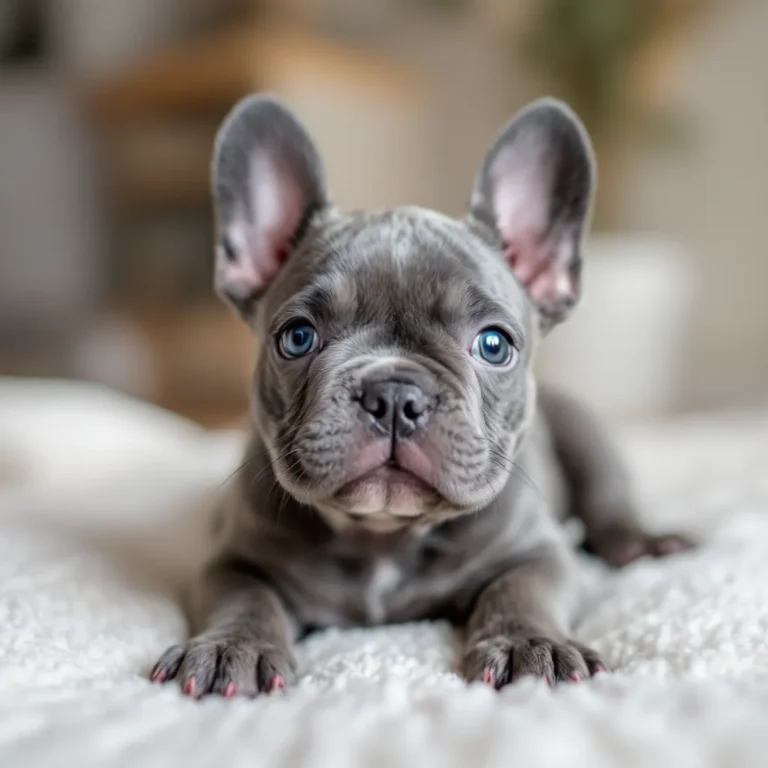
As I continue to train my French Bulldog puppy, I can gradually increase his freedom in the house by using positive reinforcement and a consistent routine. House training a puppy requires patience and consistency, but with the right techniques, you can help your furry friend become more independent and trustworthy indoors.
One effective way to increase your puppy’s house freedom is by using positive reinforcement. Whenever your puppy exhibits good behavior, such as going potty outside or staying calm when left alone, reward him with treats, praise, or playtime. This will reinforce the desired behaviors and encourage him to continue behaving appropriately.
Consistency is key when it comes to puppy training. Establishing a routine for feeding, walking, and potty breaks will help your puppy understand what’s expected of him. By sticking to a consistent schedule, you can gradually increase the time your puppy spends unsupervised in the house. Start by confining him to a small, puppy-proofed area and gradually expand his access as he becomes more reliable in his behavior.
Remember to be patient and understanding during this process. Each puppy learns at their own pace, so it’s important to stay consistent and reinforce positive behaviors. With time and practice, your French Bulldog puppy will learn to navigate the house with increasing freedom, making your life together even more enjoyable.
Celebrating Successful Potty Training Milestones
After successfully potty training my French Bulldog puppy, we can celebrate these milestones by giving him a special treat and lots of praise. It’s important to remember that potty training isn’t an overnight process and requires patience and consistency.
Crate training plays a crucial role in this process as it helps create a safe and secure environment for your puppy while also teaching them to hold their bladder.
During potty training, setbacks are common and can be frustrating. However, it’s important to stay motivated and not get discouraged. Here are some tips to help you through the process:
- Stay consistent: Stick to a regular schedule for feeding, potty breaks, and crate time. Consistency is key in establishing good habits.
- Use positive reinforcement: Reward your puppy with treats and praise every time they successfully use the designated potty area. This will reinforce the desired behavior.
- Supervise closely: Keep a close eye on your puppy, especially during the initial stages of potty training. This will help you anticipate their needs and prevent accidents.
- Clean accidents properly: Accidents happen, but it’s important to clean them up properly to eliminate any lingering smells that may encourage your puppy to go in the same spot again.
Frequently Asked Questions
How Long Does It Typically Take to Fully House Train a French Bulldog Puppy?
It typically takes several weeks to fully house train a French Bulldog puppy. Establishing a potty training routine and being consistent is key. Common challenges include accidents, stubbornness, and the need for patience and positive reinforcement.
Are French Bulldogs Prone to Having Accidents Indoors More Than Other Breeds?
Yes, French Bulldogs can be prone to having accidents indoors, especially during the early stages of potty training. However, with consistency, positive reinforcement, and a designated potty area, they can be successfully trained to minimize accidents. Nighttime potty breaks are also important.
Can I Use Pee Pads or Artificial Turf for My French Bulldog Puppy’s Designated Potty Area?
I prefer using pee pads for my French Bulldog puppy’s designated potty area. They provide convenience and ease of clean-up. However, some owners opt for artificial turf, which can mimic the feel of outdoor grass. Ultimately, it depends on personal preference and the needs of your puppy.
What Should I Do if My French Bulldog Puppy Refuses to Go to the Designated Potty Area?
If my French Bulldog puppy refuses to go to the designated potty area, I try alternative potty training methods. Dealing with stubbornness during house training can be frustrating, but patience and consistency are key.
How Do I Handle Nighttime Potty Breaks for My French Bulldog Puppy?
At night, I handle potty breaks for my French Bulldog puppy by using crate training. It’s a helpful method where I put my puppy in a crate and take them outside when they need to go.
Conclusion
In conclusion, house training a French Bulldog puppy requires patience, consistency, and positive reinforcement. It’s important to understand their bathroom needs and set up a designated potty area.
By establishing a consistent feeding schedule and supervising your puppy at all times, you can recognize signs of needing to go outside and prevent accidents.
One interesting statistic is that French Bulldogs are known to be a stubborn breed, but with the right training techniques, they can be successfully house trained.
Hi, I’m Alex! At FrenchyFab.com, I share my expertise and love for French Bulldogs. Dive in for top-notch grooming, nutrition, and health care tips to keep your Frenchie thriving.

